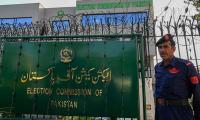The recent decision of the US administration to approve a $2.2 billion arms sale to Taiwan is likely to foment more tension between Beijing and Washington.
The two global powers have already been embroiled in a lethal trade war that has threatened to shake the global economy. In addition to that, the sabre-rattling in the South China Sea and the West’s blanket support for demonstrations in Hong Kong have also been contributing to the souring of ties between the two largest economies of the world.
Other major powers of the world are also involved in creating an impression that the world is descending into a chaos that could turn out to be very catastrophic. Old political alliances also seem to be shifting, prompting many maverick strategic thinkers to compare the present day situation to that of the pre-World War I time, which also witnessed a shifting of alliances and sparring over trade, markets, raw materials and sea routes.
Turkey, the second biggest troop contributor to Nato for decades, is hobnobbing with Moscow, infuriating not only the sole superpower but its European allies as well. Qatar, an inveterate ally of Saudi Arabia and the UAE, has been isolated by the two powerful Arab states. Doha is looking for allies in the region and beyond. India chose to get the proximity of the Western world in the aftermath of the Soviet Union’s demise. For a very long time, Moscow had been its sole supporter in the world but in the decade of the 1990s New Delhi opted to come out of that old bond, making hectic efforts to attract Western companies and capital. Today it seems to be at odds with Trump’s America which has been furious over the trading methods of the largest democracy on earth.
The US heavily invested in western Europe during the cold war to thwart the onslaught of communism; now the same free world wants to liberate itself from the ruthless clutches of Uncle Sam. Washington first disparaged Berlin and Paris but now it seems to be venting its anger against London, which has faithfully served the mighty sole power throughout the cold war and beyond. From the first Gulf War to the illegal invasion of Iraq, the UK blindly followed the dictates of war-mongers sitting in the power corridors of the Oval Office. The Western countries that went euphoric over the destruction of Yugoslavia and shared a common purpose of teaching a tough lesson to Syria and Libya now stand fragmented over the worldly issues of trade and commerce.
The US no longer wants to maintain the security cordon that it threw behind the Western countries during the cold war. It clearly wants London, Paris and Berlin to pay for their security. The gargantuan appetite for military spending does not seem to have been satiated despite the hike in military budgets of the Nato countries that would cost them around $300 billion dollars over the years. At the time only three states meet the target of spending two percent of the GDP on defence; the rest of the Nato states promised this year to move towards this target by 2024.
But despite this promise, Washington does not seem jubilant. It is not only at odds with Paris and Berlin but recently Trump’s administration has also infuriated London over the statement of the UK ambassador to the US. Ambassador Sir Kim Darroch reportedly described Trump’s administration clumsy and inept. He also accused the US of setting upon an act of diplomatic vandalism, seemingly for ideological and personality reasons.
Conservative right-wing newspapers are highlighting this issue with full vigour, accusing their government of failing to prevent Trump from scrapping the Iranian nuclear deal. This has led many critics to conclude that for the first time in decades cracks are possibly appearing in the Anglo-American alliance that dominated the world for the past 70 years. The right-wing newspapers assert that the public must know about this issue because it concerns global peace. It is surprising that the British establishment and the media elite that created the frenzy of Iraq’s invasion are now talking about peace. Critics believe that the underlying causes may be different. They may not differ over the Iranian nuclear deal only; invisible tensions between London and Washington may also have been simmering over trade and other issues.
In the Middle East, the two close and friendly states of the past seem to have turned into enemies, supporting diametrically opposite camps. Egypt, the champion of Arab nationalism, is allying with conservative kingdoms against another die-hard supporter of the pan-Arab movement – Syria. Israel and some Arab states are ganging up against Iran, abandoning the Palestinian groups that had been dependent on them for decades. In Africa major powers are turning Djibouti into a new zone of conflicting interests. China, America, India and other powers want their presence to be felt in this tiny country which is strategically very important.
In Latin America, the US is hell bent upon toppling the socialist government of Venezuela. Similarly in the Middle East if the seeds of turmoil are sown in Iran, triggering a conflict in one of the most sensitive areas of the world, then Beijing and Moscow are not going to sit idle. The conflict is likely to scupper China’s chances to emerge as the largest economic power because it may disrupt its Belt and Road Initiative. In India rumours of Hindus’ settlement in Muslim majority Kashmir could trigger a wave of violence that might invite the attention of big powers, prompting them to interfere in the region which might push the region towards a new strategic rivalry.
Washington’s rivals believe that the West is using the excuse of terrorism to meddle with the affairs of other states. They assert that in the name of Al-Qaeda, Washington and its allies captured Afghanistan and Iraq, leaving the two states in an anarchic situation and later they turned Syria and Libya into lawless lands. The four countries stand in ruins. Over three million people were decimated in the four countries in conflicts that were partly triggered by Western policies; they also led to the displacement of more than 12 million people. More than $300 worth infrastructure was also destroyed.
Such a scenario suggests that the world is descending into chaos again. The UN and other international organizations appear to be toothless bodies. The EU is fast moving towards disintegration and Washington is encouraging anti-EU populist leaders to direct their attack towards this pan-European organization. The undermining of the EU would unleash the monster of nationalism which will not only threaten Europe but other parts of the world as well. On the economic front, capitalism does not seem to offer any solution to the periodic recessions that plague the lives of millions of people.
So, if the current situation is allowed to deteriorate, it will pit giant powers against one another. Fifty percent of Germany’s GDP is dependent on exports, 25 percent of which is sent to the US. Around 25 percent of Chinese GDP is dependent on the US and the EU market, which means any upset in the current global order would affect pretty much the world itself. Therefore, urgent steps are needed to prevent global society from descending into a chaos.
The writer is a freelance journalist.
Email: egalitarianism444@gmail.com
As usual, any such deal, aiming to resuscitate ailing economy, brings to fore urge and resolve to halt further...
A representational showing sticky notes on a board. — Unsplash/FileThere are some common themes from the lives...
Whether the Daanish Schools effort has been able to live up to its principles or not may be debatable
According to the federal government, last year 653,100 people experienced homelessness on a single night in America
Another advantage for Pakistan is the enhanced teledensity and internet penetration
Both media spheres need to dovetail in amplifying the urgency of addressing climate change at the local, national, and...







